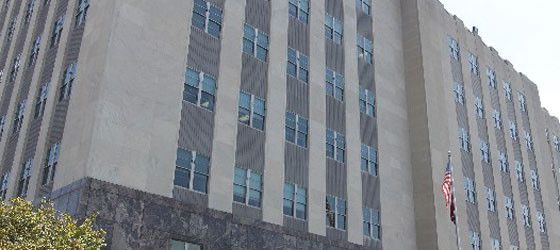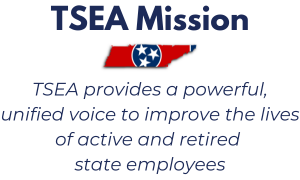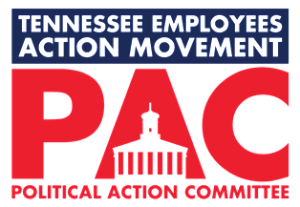Updated as of 3/14/2014:
During January’s record-breaking cold, two state office buildings in Chattanooga, managed by the giant Chicago-based company Jones Lang LaSalle (recently rebranded as just JLL), experienced major challenges with their climate control systems.
One employee of the Chattanooga State Office Building (CSOB) reported to the Chattanooga Times-Free Press that at 8:00 AM, the thermostat in her office on the 4th floor read 48 degrees. By 9:00 AM, the temperature had reached 60 degrees and did not reach a more comfortable temperature until the late afternoon. TSEA was contacted by a few of our long-time members who work in the CSOB and in the Mapp building notifying us of temperatures approaching unreasonable levels of cold and hot, respectively.
TSEA’s Employee Rights Manager JoAnn Davis-Davis contacted the Department of General Services (DGS) to inform them of the problem. We have learned that these two buildings share a boiler and chiller, which require constant attention during extreme temperature swings such as the one Tennessee experienced in January. When this unit is required to make a 70 degree temperature swing (i.e. -5 degree outside temperature to 65 degree indoor temperature) for two buildings that have single-pane windows, as well as approximately 400 air-flow dampers, problems occur.
In early February, JLL brought engineers and HVAC contractors in to work on the problem. Contractors were initially able to fix the problem and, according to daily temperature readings taken onsite, a consistent temperature level of between 68 and 72 degrees in both buildings was maintained. A few days later, the CSOB was mostly comfortable; however, employees in the Mapp building were again experiencing consistent temperatures close to 80 degrees.
Davis-Davis once again contacted DGS, and JLL responded immediately by bringing in portable chillers to maintain acceptable temperatures while they continued to work on the unit. According to one source, these spot coolers operate at a cost of $250 per week, and 16 units ($4,000 per week?) were needed in the Mapp building. We don’t know whether JLL pays for these units out of the millions contained in their contract or whether the state has to pick up this extra expense.
As of late February, JLL engineers were still having problems regulating the temperature for employees, especially on the third floor of the Mapp building where temperatures rise significantly during the afternoon. On February 26th, the portable A/C units were removed; however, temperatures continue to approach 80 degrees by the afternoon; we have been made aware by employees of these buildings that the climate problems persist, and are keeping in touch with DGS to ensure the needs of these workers are being met.
TSEA is told that DGS plans to move employees from these buildings to another location from April-July 2014 to further address these climate control issues. As TSEA learns more specific information about this move, we will let you know.
The climate control problems faced by state employees in these buildings in Chattanooga are not unique. In fact, all across Tennessee state employees are dealing with building maintenance issues. In January, TSEA was notified that an office building in East Tennessee was on their second full day of no heat. Another building had no water. Some state workers are dealing with unsafe conditions in their parking lots, when ice and snow is not removed in time to prevent a dangerous situation. Last October, a rat died in the wall of a building in Bedford County. The smell became so bad that state employees working in the building were getting sick. This building has a history of problems including large rats, mold, water leaks, and employees being bitten by brown recluse spiders. The smell problem took about a week to remedy.
TSEA is not aware of the extent of our building maintenance needs prior to 2011, when state employees handled the upkeep; however, since 2011, one of the reasons JLL has received millions of taxpayer dollars is because they, according to this administration, are supposed to do a better job maintaining our state buildings.
A NOTE ABOUT JLL
The Haslam administration outsourced the management of our state buildings to JLL in 2011. Since then, the relationship between JLL and the Administration has come in to question by several legislators, by the news, and even in an audit conducted by the state Comptroller.
JLL’s original role was to advise the state as a part of the Administration’s Project T3 by studying the use of state buildings, planning and making real-estate leasing recommendations. JLL’s role and contract has expanded over the years from an original contract of $1 million to $11 million, to a recently proposed contract amendment of $16 million, and they had been authorized to negotiate leases for the state based on their own leasing recommendations, all the while charging lessors leasing commissions of which JLL kept a portion. The audit by the comptroller found this to be a conflict-of-interest, as JLL could make unnecessary leasing recommendations just to make a profit.
In mid-December of 2013, the State Building Commission voted to phase out the initial agreement with JLL and temporarily suspend commissions the firm collects from any negotiated leases, until rules are put in place to prevent the conflict of interest.
Originally reported on 2/4/2014:
During the recent record-breaking cold, two state office buildings in Chattanooga experienced major challenges with their climate control systems. One employee of the Chattanooga State Office Building (CSOB) reported to the Chattanooga Times-Free Press that at 8:00 AM, the thermostat in her office on the 4th floor read 48 degrees. By 9:00 AM, the temperature had reached 60 degrees and did not reach a more comfortable temperature until the late afternoon.
TSEA was contacted by a few of our long-time members who work in the Mapp building and in the CSOB, who notified us that temperatures approached unreasonable levels of hot and cold. TSEA immediately contacted the Department of General Services (DGS) and learned the following: these two buildings share a boiler and chiller, which require constant attention during extreme temperature swings such as the one we experienced last week. When this unit is required to make a 70 degree temperature swing (i.e. -5 degree outside temperature to 65 degree indoor temperature) for two buildings that have single-pane windows, as well as approximately 400 air-flow dampers, problems like we saw over the last few weeks occur.
TSEA has also learned that DGS has since brought engineers and HVAC contractors in to work on the problem. Since Monday, according to daily temperature readings taken on-site, a consistent temperature level of between 68 and 72 degrees in both buildings has been maintained.
TSEA understands that the DGS will be moving employees of these buildings to another location from April-July 2014 to continue addressing the climate issues. As TSEA learns more specific information about this move, we will let you know.
If you work in either of these buildings and experience any temperatures outside of the acceptable range (68-72 degrees inside of the building), please report those immediately utilizing the OneView system here: https://stateoftn.thepsc.com/Login.aspx or call the toll free phone number 1-800-279-3102.















